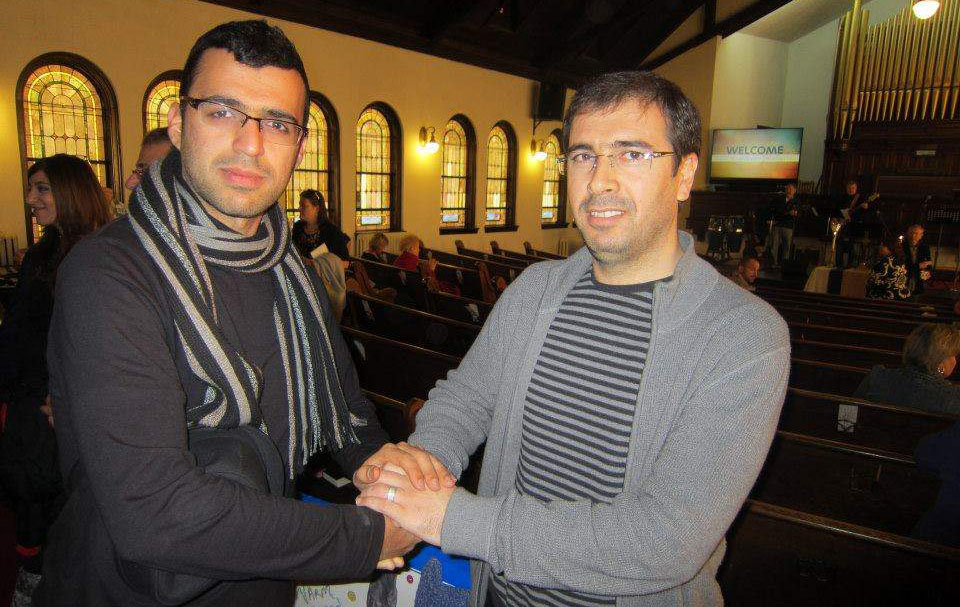
Participants like Khalid Kabbara (left) and AbuNasir Sut (right) who took part in the interfaith trip to Tennessee say they not only learned about other faiths, but they also found a greater appreciation for their own. Photo courtesy of the author.
[Sadaf Qureishsi is a student at the Georgetown University School of Medicine. Sadaf is a resident of Washington, D.C. where she spent the last four years as an undergraduate at Georgetown. She took this journey with Imam Yahya Hendi and the Georgetown Muslim Chaplaincy for interfaith relief efforts after Hurricane Sandy. These are her reflections. --- TML]
Years ago, in the South, “pounding of the preacher” was a common custom used to welcome newly hired priests to the town and to the congregation. Members of the church would each bring a pound of food to the home of the incoming priest to help stock up his pantry—a pound of sugar, a pound of flour, a pound of butter. It was small-town living and Southern hospitality at its finest. One might expect no less. But the tradition also had a greater significance. At the time, priests were relocated every few years. It was unlikely that these itinerant priests would receive a fixed salary and, often, the church would provide him his home. This tradition served as a humbling reminder to the priest that his livelihood depended upon his relationship with the people of the community that he served.
Upon arriving in Chattanooga, Tennessee with a group of 8 graduate Muslim students from Georgetown, and our Imam, I experienced something not unlike this old tradition. Though the circumstances were entirely different, the spirit was much the same. We set out for Chattanooga on the Wednesday before Thanksgiving with the hope of reaching out to our Christian sisters and brothers, of growing in mutual understanding of each other’s religions through conversation, and of building bridges between our communities by working together to restore St. Mark’s Church.
At three in the morning on Thanksgiving day, when our van finally pulled up to the Church after over ten hours on the road, members of the community were there waiting for us. They greeted us not only with smiling faces and warm words of welcome, but with a kitchen counter lined with food, a full fridge, sleeping bags, and rooms that they had prepared for us in the Church. Like the priest who arrives at a new congregation, we depended upon the people of the Church as much as they depended upon us to serve them and their community. As keenly as I felt the hospitality that early morning of our arrival, I also felt the responsibility and expectations that it implied.
Over the course of the next few days, this symbiotic relationship grew and strengthened, nourished by ongoing conversations and collaboration. We shared nearly ever meal with members of the Church who graciously cooked and served us the famed comfort food of the South. We conversed on everything from the mundane to the magnificent, learning, along the way, about each other’s backgrounds and histories and beliefs. We bonded over a shared goal as we re-painted rooms together, cleared weeds and trees and brush, and laid down mulch in the Church playground, side by side. We attended each other’s religious services, and even attended a Jewish Shabbat service together. As we worked and ate together, we grappled with common misconceptions on both ends of the table, highlighting the many overlapping areas of our philosophies without forgetting the important distinctions. Barriers melted, as we got to know one another on a personal and human level, distilling, little by little, fear of the foreign.
But it wasn’t only the foreign that I, and the others, were engaged with. It was the familiar that we re-examined as well. Raised as a Muslim from a young age, there is so much of our faith, and so many of our practices, that I had taken for granted, that I had forgotten to stop and marvel at. When the Imam explained our five daily prayers to our Christian friends, I was humbled to discover that some of what was mentioned was new to me, or had been lost in the hidden alcoves of my mind.
It took this simple trip to Tennessee for me to recognize that the true object of travel is not to set eyes on foreign land, but to gain the insight necessary to set eyes upon one’s own land, and one’s own self, as if they were foreign to you. Like the itinerant priest who is forced to keep redefining his home, I was reminded of the need not to become so comfortable with my own territory as to disregard its many mysteries, its many unexamined crevices.









Comments powered by CComment